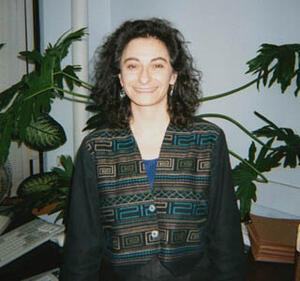Rebecca Young
Rebecca Young was born in 1964 and raised in New York City, the only child of two artists. During the early years of her life, she lived first on Staten Island, then in the Bronx, and then in Queens. She attended the local public high school in northern Virginia before graduating and studying at Harvard University for undergrad. She went on to get a Master’s in Public Affairs from the University of Texas, as well as a law degree from Boston College Law School. Rebecca Young was honored at the 2002 Women Who Dared event in Boston, and went on to open her own law firm in 2003.
Young reflects on growing up in poverty with parents who divorced when she was seven. In her youth, the family was on welfare, and Young recalls the difficulty of living in poverty and the impact it had on her political sensibilities from a young age. At 13, Young mother passed away, and she moved to Virginia to live with an older cousin. Young remembers having a strong sense of Jewish identity as a child, describing the art she made as a kid being filled with Torah’s and Stars of David despite having very little Jewish education. Young recalls losing faith after the death of her mother, and after moving to Virginia her limited observance of Jewish holidays ended altogether. Years later, Young reconnected with Judaism when she met a Jewish boyfriend, who reintroduced her to observing the high holidays and helped her reconnect with her Jewish values. After her mother died, Young recalls getting interested in the politics of the death penalty and explored the work of death row inmates in high school. When she got to college, Young knew she wanted to volunteer to work with prisoners, and signed up for a program at Framingham, which is Massachusetts’ women’s prison. She worked there throughout her time at Harvard, and after graduating went on to work in policy issues with prison reform in Massachusetts. Young talks about going on to start the Rapid Response to Brutality Project in Massachusetts, working directly with prisoners who have experienced violence while incarcerated. She is deeply invested in the work and reflects on the challenges and opportunities it has created for her. In addition to her deep commitment to prisoners’ rights, Young also reflects on her work in other causes such as women’s rights, anti-poverty, and anti-apartheid.



